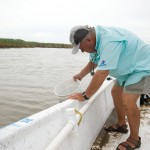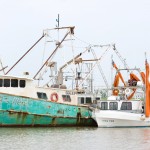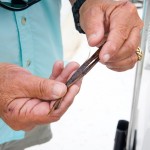You are here
Oil Spill Threatens Fisherman’s Way of Life
This story was gathered during David Snyder's visit to New Orleans. David reports on CDC programs in action for the CDC Foundation.
Past 60 now, his skin weathered by a life in the Gulf Coast sun, Darryl Eymard is hard to impress. He speaks as slowly as an outgoing tide, weighs his words with the care of a thinker and offers pearls of country wisdom across the console of his 18-foot johnboat.



“I fished all my life,” Eymard says. “Really and truly that’s where my heart and soul was.”
Eynard worked as a shrimper off of Venice, LA, and has spent the past five years as a charter boat captain. It’s easier work, taking inlanders out after speckled trout and red fish, and a welcome return to the sea.
“I got my charter license in 2005,” Eymard says. “Business has been pretty good.”
But those days may well be over for him, as the long-term effects of millions of gallons of oil in the Gulf waters remain unknown.
Though Eymard, like many fishermen, received some financial compensation from BP, it only covers about one-third of what he would make from his fishing business in a month. Perhaps surprisingly, he hopes the oil rigs stay. Many here depend on the work provided by the rigs, and emotions are mixed, despite the oil spill’s damage.
A day on the marsh with Eymard, who was born and raised in the small town of Buras, LA, offers a glimpse into a way of life under siege.
“They can send a Tonka toy to the moon and play with it for a year, but they can’t fix this,” Eymard says. “We’ll survive. But the marshland and the creatures that live in it – who knows?”
